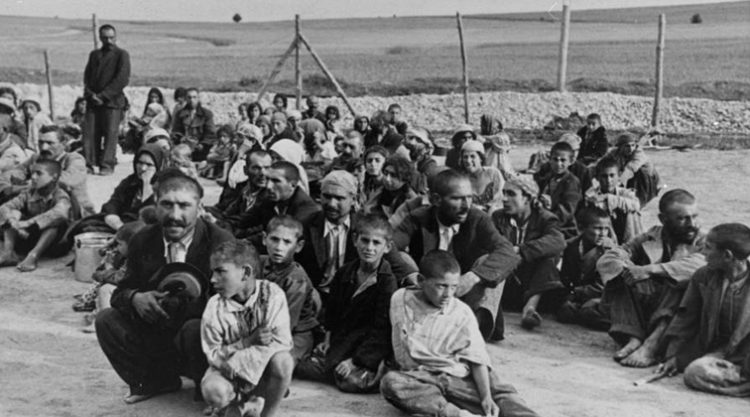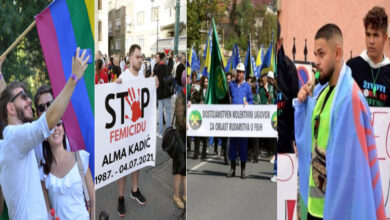No place for Roma history in BiH education system

Slađan Tomić
If you open any of the history books in BiH schools, you will not find anything about the Roma.
Though they are mentioned in some textbooks, but very briefly, superficially, and stereotypically. Their culture is written about as nomadic people who celebrate St. George's Day.
As the largest national minority living in Bosnia and Herzegovina, the Roma deserve to be written about, not only because of their numbers but also because of everything they have been through in BiH's long history.
They are isolated from the scientific, educational, and academic discourse which is witnessed by the fact that the history of the Roma was last week discussed at the academic level at the International Scientific Conference ‘History of Roma in Bosnia and Herzegovina’, organized by the University of Sarajevo – Institute of History, and the Institute of Social Sciences Ivo Pilar – Zagreb.
RARELY ABOUT ROMA
A member of the conference's organizing committee, Sanja Gladanac-Petrović, a research associate at the Institute of History of the University of Sarajevo, says that this is the first time that the history of Roma in Bosnia and Herzegovina is discussed at an academic level. Earlier, Roma were rarely talked about, but never about their history in Bosnia and Herzegovina.
– The International Scientific Conference on the Culture and Language of the Roma was organized in 1986, attended by around fifty scientists from our country and Europe, but then the emphasis was on language and culture, and today we are talking about the history of Roma – says Gladanac-Petrović, one of the few representatives of Bosnian academic community engaged in Roma history.
The history of Roma was on the margins of science for years. Members of the academic community were not interested in this topic, and professors and researchers were not interested in the history of their fellow citizens.
– It wasn't the case in recent years, but here, these are some pioneering attempts to popularize this topic and remove it from the margins of science. The goal of the conference was to gather and encourage researchers who, through their research, can contribute to a better understanding of the complex history of Roma in Bosnia and Herzegovina, and to encourage these and other researchers to research the so-called ‘Roma topics’ – says Gladanac-Petrović.
There is no content on the historical context of Roma life in the textbooks in Bosnia and Herzegovina, and Gladanac-Petrović says that the responsibility is on several social groups.
– The problem is the absence of Roma activism, they need to insist on being as visible as possible, but the responsibility should also be on the academic community, which should put more research emphasis on the Roma and insist that their history gets included in our textbooks. As I said, the Roma are an integral part of this population and Bosnia and Herzegovina's past, and they deserve to be explained where they came from, what their culture is like, why they are so marginalized and at some point unwanted, and why crimes were committed against them during the Second World War – says Gladanac- Petrović.
THE MOST DISCRIMINATED MINORITY
Danijel Vojak, senior research associate at the Ivo Pilar Institute in Zagreb, told Newipe that it is very important to talk about the history of Roma, culture, and other aspects related to Roma, precisely because at the same time they fight against discrimination, still present, not only in Bosnia and Herzegovina but also in most European countries.
– The Roma are the most discriminated minority in socio-economic, educational, and every other sense – says Vojak.
The conference was organized to understand the historical context, according to Vojak, in which the role of the Roma in BiH history is neglected.
–Why? Because it is neglected, because no one systematically deals with their problems, and the Roma themselves did not have an intellectual among them who, like the Jews, Croats, Bosniaks, etc., would have the interest and motivation to deal with this topic. That is why it is important that we had this conference, that we opened topics since the Austro-Hungarian, Ottoman period. It is also important to mention the post-war period and the problems the Roma have in the context of culture and history, to simply arouse interest here in BiH, so that maybe a student, assistant, or professor, will come up with the idea of ‘yes, I would like to, look at me, that's extremely fascinating, I'm interested in it, I'd like to deal with it now’. That's how I started around twenty years ago, precisely out of spite, wondering why there is so little about a nation that lives with us – says Vojak.
When he started to get involved in the history of Roma, they were mentioned very little and mostly negatively. Today, the situation in Croatia is a little better.
– Now the situation is somewhat different, it is a little better, but it is still insufficient, we still do not have anyone in BiH, except for my colleague Sanja Petrović, who is here at the Institute of History, and systematically deals with this. We lack that. And something else we lack, which is what I'd like to tell your readers, and that is a young, active, educated Roma intellectual who would come and say “I want to work on reasons for which my grandfathers, grandmothers, other relatives were killed. We lack that – Vojak said.
ROMA – THE OTHERS
Killed, mistreated, tortured, imprisoned in camps, excluded from society, marginalized, discriminated against… this is how, among other things, the Roma lived throughout the history of BiH. For this reason, this life and attitude towards the Roma should be described and published in textbooks.
– This is the awareness of the fact that the history of Roma is seen as the history of the others, they are always the others, they do not have their own home country, and in that, shall we say, a nationalist context where textbooks project national history, you have the history of Europe, world history, but history textbooks are primarily for learning national history. If you are aware that in historiography the Roma are not part of our history, but are always others, then the normal consequence of that is that we do not have them in history textbooks – says Vojak.
And if he adds, the suffering of Roma is mentioned, then they're mentioned in one sentence. In Croatian textbooks, after 10 years of dedicated work, the situation is changing, there is more information, but mostly just about the Second World War.
– This is information about their suffering, not about the fact that they have lived with us since the 14th century, that they influenced culture, life, and the economy, and that they are an integral part of our history. There is still no such awareness, unfortunately, there is no such awareness in many European countries, I cannot single out any of them as a positive example. Unfortunately, there is no such thing, but conferences like this generate interest, and they start things. I'm not saying that something will come out of this except that we will publish a book, and maybe that book will be written by a young Roma student, who has finished high school and is now thinking about what he will do in life, and who might have a personal story in which someone in his family died, and he might take the book in his hands, so that motivates him to start researching – says Vojak.
ROMA IN BOSNIAN TEXTBOOKS?
One of the reasons why Roma should be included in textbooks in BiH, according to Gladanac-Petrović, is the fact that Roma are the most numerous, but also one of the oldest national minorities in Bosnia and Herzegovina.
– In this context, they certainly deserve to be treated in textbooks, that is, their history, a presentation of their centuries-long presence on the territory of Bosnia and Herzegovina because they are indeed a part of that society and the past of Bosnia and Herzegovina – our interlocutor says.
What we can find about Roma in textbooks today is not enough. There is no information about culture, life, suffering, or arrival in Bosnia and Herzegovina. Textbooks only mention that a mass crime was committed without providing details and context.
- There is no context as to why the Roma become undesirable, or how they find themselves in a situation where the Ustasha government commits such brutal crimes against them that will be characterized as genocide. It is very important to explain to future generations why a national minority, which has very little influence in society, suddenly becomes such a danger that, for example, the Ustasha government commits genocide against it. This is, in fact, the most important role of education, to show you how one nation in one environment in a social context can become undesirable and the target of violence policy – Gladanac-Petrović explains.
When speaking about the Roma, the educational literature and political speeches mention them only briefly. It is the same with commemorations and memories as if the Roma were incidental, not chosen targets of criminals and ideologies.
– Primacy is always given to national victims, and then the declaration in the National Assembly of the RS mentions Serbs, Jews, and Roma, but when you read the declaration, you see that the emphasis is on the most numerous national group – the Serbs – that they are the motive for initiating such political actions that result in declarations. Roma are marginalized in society, and then this marginalization is transferred to their portrayal in textbooks. What is very interesting is that this is the way to commemorate Roma victims inappropriately – explains Gladanac-Petrović.
She says that Roma appears in our public space only twice a year, on the Day of Remembrance of Roma Victims of the Holocaust, August 2, and on World Roma Day, April 8.
– When Roma victims are commemorated, people talk about suffering so that we get the impression that the perpetrator is the Nazi government. Yes, they are the executioners in Germany and in those places where the Nazi authorities had power, but they did not have the executive power in BiH but the executioners here were Ustashas! It is also very interesting that the representatives of Roma associations, as well as political officials who find it very convenient to appear in such places, point out that genocide was committed against Roma in Europe, that it was done by the Nazi authorities, and then there comes the famous sentence that Bosnia and Herzegovina is the only country where this has not been done – says Gladanac-Petrović.
Roma are an important part of Bosnian history, and their suffering is no less important than the suffering of Bosniaks, Serbs, Croats, Jews, and others. It is the duty of everyone, with influence in public space, especially the academic community, to speak about it, write, and/or research.
(Newipe)





